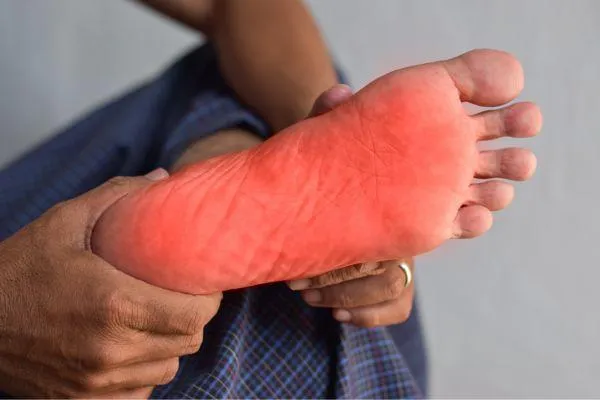
Plantar Fasciitis and Footwear: Choosing the Right Shoes for Relief
If you’re dealing with plantar fasciitis, you probably already know how painful and frustrating it can be. One of the most important factors in managing plantar fasciitis is wearing the right shoes. The right footwear can help alleviate pain, prevent further injury, and speed up recovery. In this post, we’ll explore how choosing the right shoes can provide relief from plantar fasciitis and what to look for when selecting footwear.
How Footwear Affects Plantar Fasciitis
Plantar fasciitis is a condition where the plantar fascia—the thick band of tissue that runs along the bottom of your foot—becomes inflamed. This often results in sharp, stabbing pain in the heel, especially with your first steps in the morning or after standing for long periods.
Wearing shoes that don’t offer proper support or cushioning can make the condition worse. Ill-fitting shoes or shoes without adequate arch support can put added pressure on the plantar fascia, leading to more pain and even making recovery more difficult. That’s why selecting the right footwear is critical in managing this condition.
What to Look for in Shoes for Plantar Fasciitis
When choosing shoes to relieve plantar fasciitis pain, here are the key features you should look for:
Arch Support
Shoes with proper arch support are a must for plantar fasciitis sufferers. If you have flat feet or high arches, proper arch support helps distribute weight evenly across your foot and reduces the strain on the plantar fascia. This can significantly reduce pain and inflammation.Cushioning
Cushioning in the heel area is essential for absorbing shock with each step. A shoe with a well-cushioned midsole or heel can provide comfort and protect the plantar fascia from impact, helping to reduce pain.Heel Height
Flat shoes or shoes with very low heels can aggravate plantar fasciitis. On the other hand, high heels put too much pressure on the front of your foot, shifting more weight to your heel. Look for shoes with a slight heel—around 1 to 1.5 inches—which will keep your foot in a neutral position and provide proper support to the plantar fascia.Firm Sole
A firm and supportive sole will prevent your foot from overpronating (rolling inward) or supinating (rolling outward), both of which can strain the plantar fascia. Shoes with a flexible but supportive sole provide the balance of flexibility and stability your foot needs.Proper Fit
Make sure the shoes fit properly! Shoes that are too tight or too loose can cause discomfort and affect your gait, which may exacerbate plantar fasciitis. Ensure that the shoes are snug but not too tight in the toe box, with enough room for your toes to move freely.Shock Absorption
Shoes with good shock absorption in the heel and arch areas can reduce the impact on your foot while walking or running. Look for shoes with EVA (ethylene-vinyl acetate) midsoles or gel padding, which can cushion each step.
Types of Footwear to Consider for Plantar Fasciitis
Now that you know what to look for, let’s talk about the types of shoes that work well for people with plantar fasciitis:
Running Shoes
Running shoes are designed with arch support, cushioning, and shock absorption, which makes them a great option for plantar fasciitis sufferers. Many brands offer orthotic-friendly versions, allowing you to insert custom insoles for extra support.Orthopedic Shoes
Orthopedic shoes are specifically designed for foot health. They offer exceptional arch support, cushioning, and stability. These shoes may not always be the most stylish, but their comfort and therapeutic benefits make them a solid choice for managing plantar fasciitis.Sandals with Arch Support
If you prefer wearing sandals, look for ones that have built-in arch support, such as those with contoured footbeds or custom orthotics. Brands like Birkenstock and Vionic are known for creating comfortable sandals that offer relief for foot conditions like plantar fasciitis.Dress Shoes with Arch Support
Finding comfortable dress shoes with good support can be a challenge, but it’s not impossible. Look for dress shoes that have a cushioned insole and built-in arch support. Some companies specialize in stylish dress shoes designed specifically for foot health.Slip-Ons and Loafers
Slip-on shoes and loafers can offer the comfort of easy wear, but they still need to have adequate arch support and cushioning. Opt for those with orthotic-friendly insoles to ensure maximum comfort throughout the day.
When to Use Orthotics
If you’re not finding enough relief with regular shoes, consider adding orthotic insoles to your footwear. Orthotics are custom-made insoles designed to provide additional arch support, cushioning, and alignment for your feet. They can be particularly beneficial for people with plantar fasciitis, as they redistribute pressure and help reduce strain on the plantar fascia.
Your podiatrist can help you determine whether custom orthotics are right for you, or if over-the-counter insoles might provide enough support.
Conclusion
Choosing the right shoes for plantar fasciitis is one of the best steps you can take to reduce pain, support healing, and prevent further injury. Whether it’s finding the right running shoes, orthopedic footwear, or adding custom orthotics, the right fit can make all the difference in your recovery.
If you have questions about choosing the best footwear for your feet or need help with managing plantar fasciitis, don’t hesitate to reach out to us at Pomona Valley Podiatry Group. Our team is here to help you find the right solutions for your foot health and get you back to living pain-free!
Ask And His Team
Fill in the form to request a Call From Our Team
One of our team will call you for FREE and answer any questions or concerns you may have about your uncomfortable foot condition





